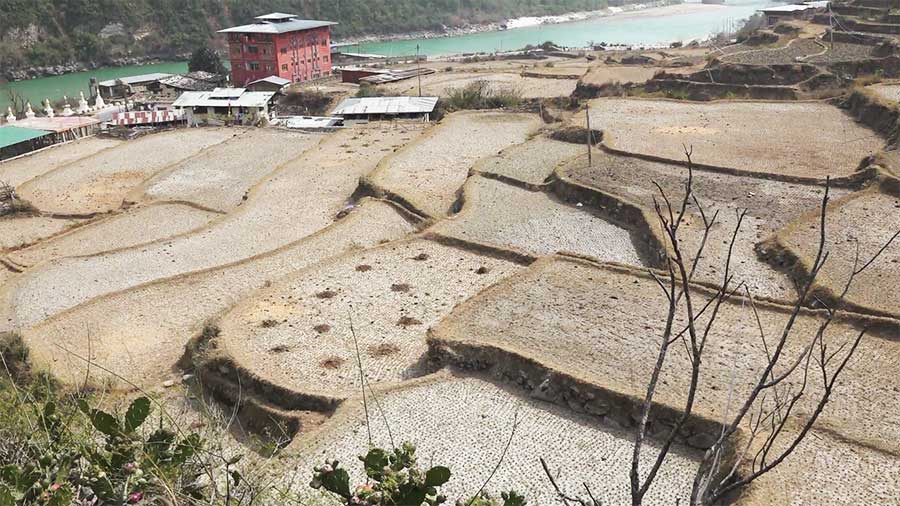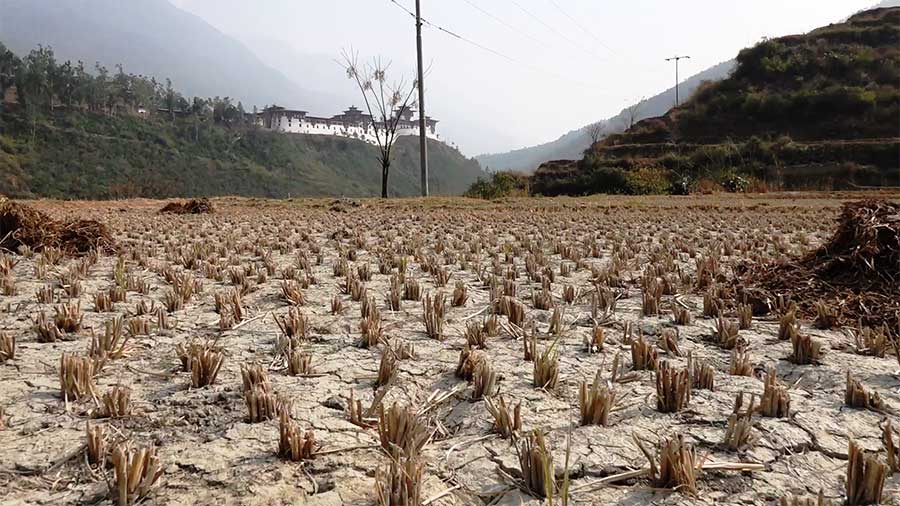
The lack of irrigation water is taking a toll on the livelihoods of paddy farmers of Rinchengang at Thedtsho Gewog in Wangdue Phodrang. It will be the second consecutive year the farmers of Rinchhengang Toed and Maed Chiwog will miss spring paddy cultivation. The farmers there cultivate paddy twice a year for a sustainable livelihood.
 Usually, by this time of the year, the paddy fields at Rinchengang will be tilled, irrigated and all set for cultivation. Likewise, even paddy saplings will be ready for transplantation.
Usually, by this time of the year, the paddy fields at Rinchengang will be tilled, irrigated and all set for cultivation. Likewise, even paddy saplings will be ready for transplantation.
They normally begin the spring paddy transplantation works by March and harvest it by June. But this time, the farmers haven’t even raised any paddy saplings.
Things changed since last spring as paddy fields remain dry leaving the farmers jobless during what otherwise is a busy season.
The village has been facing an acute shortage of irrigation water.
The existing irrigation water supply is disrupted by the ongoing project to supply additional irrigation water. The ongoing construction of an additional irrigational water supply is being carried out from the same source at Nahing Rongchhu in Nahi Gewog through the same water canal. The source is located at around ten kilometres from the village.
The construction works caused a blockage at the source while constructing water tank. In addition, the canal is also blocked while constructing road.
An official says they cannot clear the blockages due to the ongoing irrigation water supply project.
With the disruption of the irrigation water supply, farmers are worried. They say it will affect rice self-sufficiency and deteriorate their biannual paddy cultivation culture if the problem prolongs.
“There are chances of facing food shortage as our population is increasing annually. Similarly, there is a risk of facing economic crises. Moreover, I can foresee a decline in the biannual paddy cultivation culture in our community if we fail to practice it continuously hereafter,” said Kinley, a farmer from Rinchhengang Toed.
“We have to depend on rice production to buy vegetables and other grocery items. It may not be a problem for those who have enough rice, but for people like us, it’s difficult, as we have many children to raise. We didn’t face any problem when we could cultivate rice twice a year,” said Pema, another farmer.
Galem, a farmer from Rinchhengang Maed also said “we cannot cultivate paddy when there is no irrigation water. We cannot buy rice from market since we do not have money. It is really concerning when we cannot cultivate paddy due to lack of irrigation water. We have eleven people in the family and it is worrying to provide enough food for all.”
The District Administration provided them with wheat seed last year, as an alternative to spring paddy cultivation. But this time, the farmers could not grow wheat due to the shortage of irrigation water. Let alone spring paddy cultivation, some are even worried if they will receive irrigation water for summer paddy cultivation.
Besides contributing to self-sufficiency, spring paddy cultivation is a source of income for the farmers. Locals say they used to earn up to Nu 15,000 by selling rice.
Kinley, Farmer, Rinchhengang Toed, Thedtsho, Wangdue Phodrang (Dzo)
“Actually, we used to transplant paddy in the second month and harvest by the sixth month of the Bhutanese calendar. As our rice will be the first to hit the market during that time, it fetches a good price in the market,” added Kinley.
“It is given that our people will not be able to improve their livelihood if they fail to access the irrigation water like last year. Anyhow, we will wait and see for a year, as suggested by the concerned officials. If they fail to address the problem by next year, we will take the matter to wherever we see a solution,” said Chhador, Thedtsho Gup.
According to the district officials, the ongoing additional water supply project work is supposed to complete by the end of this month. The progress of the year-long construction project was hampered by the pandemic. As a result, the duration was extended by a year. Officials assured that the problem would be resolved following the completion of the ongoing irrigation water supply construction project.
More than eighty households in the two Chiwogs have been practising spring paddy cultivation since 2007.
Changa Dorji, Wangdue Phodrang
Edited by Phub Gyem






